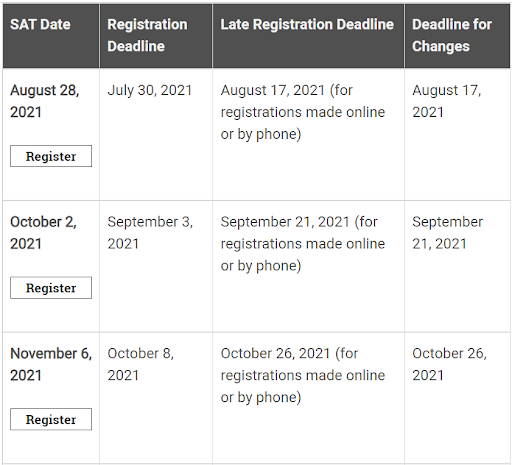As your students are settling back into school for the new year, they’ll likely need a little guidance on how best to organize their time. To get the most out of their schedule, they’ll need to accommodate for extracurricular activities, part-time jobs, and of course, SAT/ACT prep. Not all educators are required to be test prep experts — that’s our gig. But you can only help out your students if you have a basic knowledge of some of the related issues you’ll most likely be asked about.
1. First, here are the SAT/ACT basics!
Let’s start with how the two are similar. Both exams are about three hours long. If a student takes the ACT with the essay, 40 minutes are added to their testing time. Both exams consist of multiple-choice questions that test students on concepts related to math, reading, and writing. In both cases, colleges use these exams for admissions purposes as well as awarding merit-based scholarships.
Now, let’s consider how the SAT and the ACT are different! Perhaps the biggest distinction involves the calculator. While the ACT allows calculator usage for the entirety of the Math section, the SAT has divided its Math section in two: one section permits a calculator, and the other does not. Furthermore, while both exams cover many of the same math concepts, the SAT may also include Data Analysis questions while the ACT may include questions on Probability & Statistics. Famously, the ACT also includes a Science section, though only a cursory knowledge of science concepts is required for most questions.
The tests are also different in how they are scored. Each multiple-choice section on the ACT is graded on a scaled score between 1-36. All of these scores are averaged to create the final composite score on this scale. Meanwhile, the three sections of the SAT are scored on a scale of 400-1600.
2. Students can take the SAT/ACT as many times as they want.
The burning question on the lips of teenagers across the country is going to be the same: “How many times do I need to take it?” The short answer is, as many times as they want. The long answer is, as many times as they need.
The average high school student will most likely take these tests two or three times. It is never advisable to only take these tests once, but realistically, a student may have neither the time nor the energy to take it more than twice. Still, studies have shown that there is a steady increase in performance on both the SAT and the ACT: the more times a student takes it, the higher they’ll score! Moreover, multiple SAT scores are vital for superscoring; if a student only has one set of scores, they won’t be able to opt to only have their best scores considered.
At the bare minimum, taking the SAT twice is enough to superscore the results, which every student should do. Regardless, both the SAT and the ACT demonstrate that practice makes perfect, so be honest with your students and encourage them to take it as many times as they are able.
3. Registration deadlines are approaching fast.
For students taking the ACT, their next deadline is right around the corner! August 6th is the deadline to register for the exam occurring on September 11th. For students interested in taking the ACT in October or November, you should urge them to register as early as possible in the school year.
For students taking the SAT, the registration deadlines are listed all the way up through June 2022, enabling you to plan out your SAT calendar all the way up through the next school year. But let’s focus on the fall for now. Here are the upcoming deadlines provided by the College Board:
Although students can still register late for the August SAT, they will have to wait until October if they miss the cutoff. Once the school starts, the initial registration deadline for the October test will already be upon them. These deadlines are especially pertinent for rising seniors. The sooner they complete their college admissions tests, the sooner they can dive into their college applications — especially for anyone aiming for early action/early decision deadlines.
4. The SAT essay has been removed… but the ACT essay remains.
Back in January, the College Board decided to kick off the new year in style by suddenly announcing that the SAT was scrapping the essay portion. Since its inclusion in the spring of 2005, the SAT essay has remained a controversial component of the exam. Most colleges considered the essay an optional requirement, and in more recent years, some admissions officers disregarded the essay outright when reviewing applicants. Thus, it was only a matter of time before the essay was canceled altogether.
However, confusion still remains among students regarding the relevance of essays on these standardized tests. While the SAT no longer includes an essay component, the ACT still does. The ACT essay is an optional 40-minute written test in which students must analyze and respond to multiple perspectives on a given issue. Since the ACT essay is optional, most of your students probably won’t take it. That said, your students should double-check the admissions requirements for every college they’re applying to — remind them to never make any assumptions when it comes to their college applications!
5. Most universities are not requiring SAT/ACT for Fall 2022 admissions.
The National Center for Fair and Open Testing recently released a list of over 1,600 colleges and universities adopting test-optional policies for Fall 2022 admissions. This list comprises nearly two-thirds of all colleges and universities across the country!
What does this mean for your students? It means that the conversations around the SAT/ACT may need to be reframed. Since a substantial number of their prospective colleges will be going test optional, your students will probably be wondering if they need to take these tests at all. This is an ideal opportunity to remind them that college admissions officers are looking for signs of academic excellence. A student taking the initiative to score high on the SAT/ACT despite test-optional policies will likely impress admissions officers due to their ambition, work ethic, and achievement.
While some students may simply be unable or unwilling to take these tests, others should be encouraged to aim high and wow admissions officers with their high scores and willingness to stand out among their peers.
But all of this merely scratches the surface of the ins and outs of these exams. If any of your students are looking for more information on the SAT or the ACT, they should start by clicking here for a free consultation.


